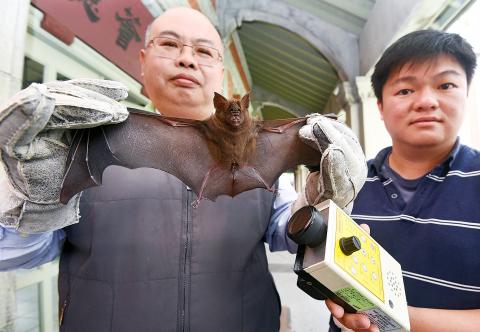Imidacloprid — a neonicotinoid pesticide that the US Environmental Protection Agency says can be harmful to bees — is a threat to the survival of bats, a research team said.
The team, headed by National Taiwan Normal University professor of life sciences Wu Chung-hsin (吳忠信) found that bats feeding on imidacloprid-tainted insects were unable to fly along learned paths and often got lost while hunting.
With Formosan leafnosed bats as their experimental subject, the team found that animals treated with a low dose of imidacloprid developed neural apopotosis — a process of programmed cell death — in the brain, Wu said.

Photo: Liao Chen-huei, Taipei Times
“The sonogram of ultrasounds emitted by such bats becomes incomplete,” Wu said on Wednesday, discussing research published in April last year in Neuroreport, a peer-reviewed journal of neuroscience.
Wu said his team monitored sonograms with a customized flight tracking device and filmed light trails from LEDs attached to the bats.
The data indicated that after long-term exposure to imidacloprid, their flight patterns differed from paths they had learned.
“What were regular flight paths become disoriented,” Wu said, adding that “some even lost their ability to catch insects.”
The team found that the toxicity of imidacloprid and high doses of the heavy metal manganese accumulated in the bodies of bats if they fed on pesticide-tainted insects.
“When toxic substances accumulate to a certain level, they damage the bats’ neurons and destroy their echolocation system,” said Wu, whose team has researched the echolocation ability of bats in Taiwan for more than 20 years.
Wu said that the team has recorded a decline in bat populations across Taiwan in recent years, speculating that the phenomenon could be the result of various environmental pollutants.
Bats serve as a “bio-index,” allowing people to determine which toxic substances are poisoning the environment, Wu said, adding that he hoped the research would alert people to the dangers of pollution.
He said that people should reduce the use of pesticides, curb pollution and learn to live more harmoniously with nature.
Imidacloprid is a broad-spectrum insecticide that works by interfering with the nerve impulses of insects, killing them. It is used to control pests on a large number of agricultural crops.
In recent years there have been reports that suggest neonicotinoid pesticides, including imidacloprid, are the cause of bees dying, hives collapsing and plummeting bee populations worldwide.

A strong continental cold air mass is to bring pollutants to Taiwan from tomorrow, the Ministry of Environment said today, as it issued an “orange” air quality alert for most of the country. All of Taiwan except for Hualien and Taitung counties is to be under an “orange” air quality alert tomorrow, indicating air quality that is unhealthy for sensitive groups. In China, areas from Shandong to Shanghai have been enveloped in haze since Saturday, the ministry said in a news release. Yesterday, hourly concentrations of PM2.5 in these areas ranged from 65 to 160 micrograms per cubic meter (mg/m³), and pollutants were

Taiwan’s armed forces have established response protocols for a wide range of sudden contingencies, including the “Wan Chun Plan” to protect the head of state, the Ministry of Defense (MND) said today. After US President Donald Trump on Saturday launched a series of airstrikes in Venezuela and kidnapped Venezuelan President Nicolas Maduro, concerns have been raised as to whether China would launch a similar “decapitation strike” on Taiwan. The armed forces regularly coordinate with relevant agencies and practice drills to ensure preparedness for a wide range of scenarios, Vice Minister of National Defense Hsu Szu-chien (徐斯儉) told reporters before a

EVA Airways on Saturday said that it had suspended a pilot and opened an investigation after he allegedly lost his temper and punched the first officer several times as their plane was taxiing before takeoff at Los Angeles International Airport. According to a report published on Thursday by The Reporter, the incident occurred after the flight’s Malaysian first officer tried to warn the Taiwanese pilot, surnamed Wen (文), that he was taxiing faster than the speed limit of 30 knots (55.6kph). After alerting the pilot several times without response, the first officer manually applied the brakes in accordance with standard operating

Japanese Councilor Hei Seki (石平) on Wednesday said that he plans to visit Taiwan, saying that would “prove that Taiwan is an independent country and does not belong to China.” Seki, a member of the Japan Innovation Party, was born in Chengdu in China’s Sichuan Province and became a naturalized Japanese in 2007. He was elected to the House of Concilors last year. His views on the Chinese Communist Party (CCP) — espoused in a series of books on politics and history — prompted Beijing to sanction him, including barring Seki from traveling to China. Seki wrote on X that he intends